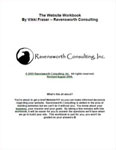What's the website workbook?
The website workbook is a free guide to help you understand all of the facets of the website building process. We can't create a website without understanding your business. The workbook translates your business and your vision into helpful information that will allow us to build the best website for you. The workbook includes helpful information including:
The Ravensworth process- cost structures, time lines, contracts, and methodology.
All about the Internet - Helpful information and lingo so you understand a small part of how websites and their related technology work.
Sales and Marketing online - Helps you to decide how you would like to represent yourself with your online presence. Colors, styles, structure and more are explained and demystified!
|

|
| There is NO CHARGE for the website workbook. Some of our competitors charge for theirs. (We bought one as reseach...don't bother) If our workbook isn't helpful to you... it was free, quit yer yappin'. |
|
An excerpt from the website workbook:
What about the money? Let’s go over the components of what every web developer charges you for when creating a site. There a basically 3 aspects to charges for a website.
One, registering a domain name. This is your address like www.mysite.com. You can register yourself or we can register it for you (more about this later). Usually this will cost you between 10 and 30 dollars and must be paid every year. This is a third party fee paid to the registrar (the guys who run the addressing of the internet).
Two, the cost of building the website. (Internet compatible documents, pictures, words, etc. known as web pages). This varies greatly depending on what you want and is usually provided to you in a quote from the developer.
Three, web hosting. A monthly fee charged for keeping your website on a computer linked to the Internet. Usually 20-60 dollars depending on the amount of space your site takes up. Hosting computers (called web servers) are usually located in high tech facilities to protect against fire, theft and natural disasters. Hosting costs more if you need secure areas to take credit card numbers or personal information.
|



